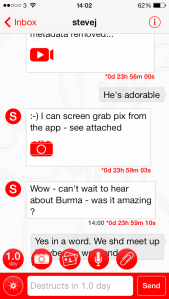The sale of WhatsApp to Facebook for $19 billion and the heightened awareness of data security in an NSA-watched world have created a perfect storm for apps that offer messaging with a privacy-first ethos. Wickr, which lets users send encrypted and self-destructing messages, is today announcing that it has raised a Series A of $9 million.
Wickr will use the funds to grow its standalone product and also to build out its business model. With the main app free and dedicated to remaining so, that business model will be based on licensing its encryption and self-destructing technologies to other messaging apps. And TechCrunch understands that telcos and other companies providing messaging services (think: enterprise users here) are also in the customer pipeline.
The investment was led by Alsop Louie Partners, a VC that has backed companies that include Twitch and Justin.tv. Last year the VC took a big swing towards privacy, raising a $100 million fund to back security companies. That has included a round of an undisclosed amount in cybersecurity startup DeviceAuthority.
Other backers include Thor Halvorssen, president of the Human Rights Foundation; Gilman Louie, former head of the C.I.A.’s venture arm In-Q-Tel; networking company Juniper; former counterterrorism tsar Richard A. Clarke; Eileen Burbidge of Passion Capital in London and other investors that are not being made public.
With the news that Telegram — another messaging app that promises data security to its users — has picked up some 8 million new sign ups in the wake of the WhatsApp acquisition, Wickr has also seen its own uplift. TechCrunch understands that right now they are adding between 50,000 and 200,000 new accounts per day — and, as pointed out in a profile from this weekend in the New York Times , Wickr saw a 50% jump in the rate of sign ups after the Snapchat data breach earlier this year, and a further 600% jump after the WhatsApp/Facebook news broke. It’s an acceleration: back in September 2013, the company told me that it had “hundreds of thousands” of users and serving millions of messages daily.
The bigger trend for Wickr, Telegram, and even apps like Secret and Whisper, is the idea of making social networking a more protected experience that can be better controlled by those of us who engage in it.
In my opinion, I think it’s still too early to tell how this trend will develop longer term. Will apps like Secret and Whisper, for example, see sustained traction beyond their initial buzz? Will Snapchat gain enough critical mass with more than younger users?
But despite this, the idea of Wickr licensing its technology points to one interesting concept: if Facebook has put out a mission to be the unifying “social graph” that binds different services together, perhaps we might see an alternative “graph” or network of services developing that will give us similar kinds of functionality, but with more peace of mind for those who don’t want to become a datapoint and marketing endpoint in exchange for the privilege.
 Wickr works bypasses servers in favor of a direct sender-to-recipient architecture. It also lets users set time limits for their messages to each other. And there are little touches within the app that speak of protection. For example, when you send photos or videos, you can only view them within the app while pressing on the camera/video icon — although you can still create screengrabs using your other hand. Wickr also lets users send documents to each other from Dropbox and Google Drive — a list of cloud storage providers that I suspect is likely to grow.
Wickr works bypasses servers in favor of a direct sender-to-recipient architecture. It also lets users set time limits for their messages to each other. And there are little touches within the app that speak of protection. For example, when you send photos or videos, you can only view them within the app while pressing on the camera/video icon — although you can still create screengrabs using your other hand. Wickr also lets users send documents to each other from Dropbox and Google Drive — a list of cloud storage providers that I suspect is likely to grow.
What will be interesting to see is how dedicated Wickr and its founder/CEO Nico Sell — who also co-founded the DEF CON security/hacker conference — remain to their original principles. Sell has in the past referred to Facebook as “the devil” when talking about the its reported interest in ephemeral messaging app Snapchat:
“The last thing I want to do is sell to Facebook. They’re the devil,” she told Business Insider. “This type of a [secure] communication is a human right. Everyone in the world deserves it, and I’d never sell to a company that would complicate that.”
That hasn’t kept the FBI from asking, at least on one occasion pretty indiscriminately. According to this article from PCMag, at a recent RSA conference, Sell announced Wickr changing from RSA to elliptic curve encryption, closing off the possibility of a data backdoor. Then this happened:
“As she left the stage, before she’d even had a chance to take her microphone off, a man approached her and introduced himself as an agent with the Federal Bureau of Investigation. He then proceeded to ‘casually’ ask if she’d be willing to install a backdoor into Wickr that would allow the FBI to retrieve information.”
Unsurprisingly, Sell refused. “I’m not against helping law enforcement, but the most important thing to me is protecting my friends and family the best way I know how,” she said at the time. “There are plenty of ways to track people without trampling human rights.” She then proceeded to “lecture” the G-man on subjects like “the First and Fourth Amendments to the Constitution, to George Washington’s creation of a Post Office in the U.S.” before then proceeding to asking him lots of questions about himself. He got the message and left.
Image: Flickr
